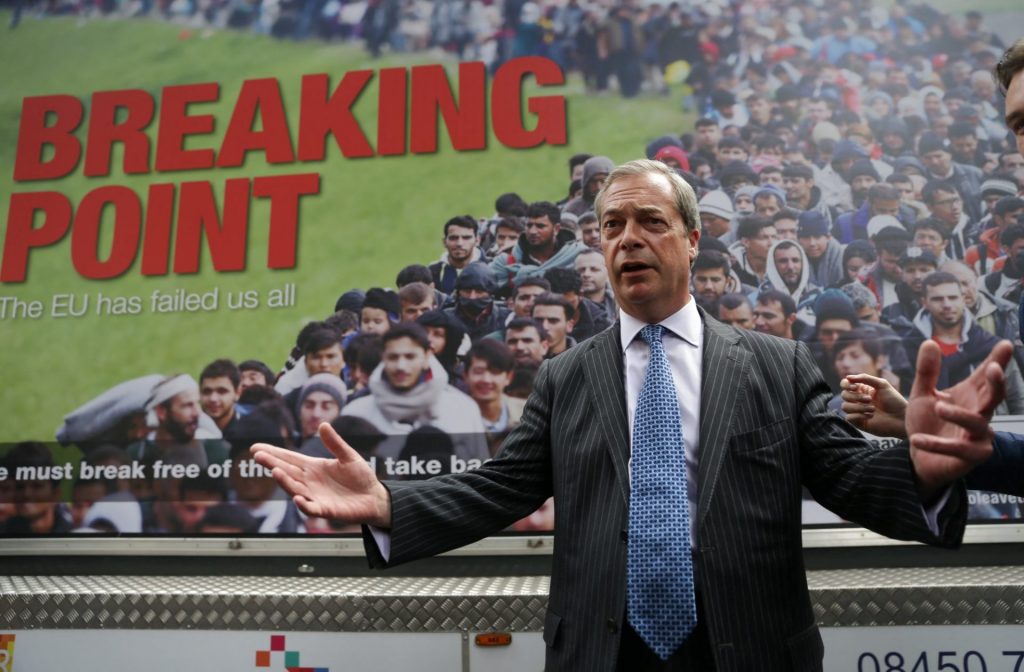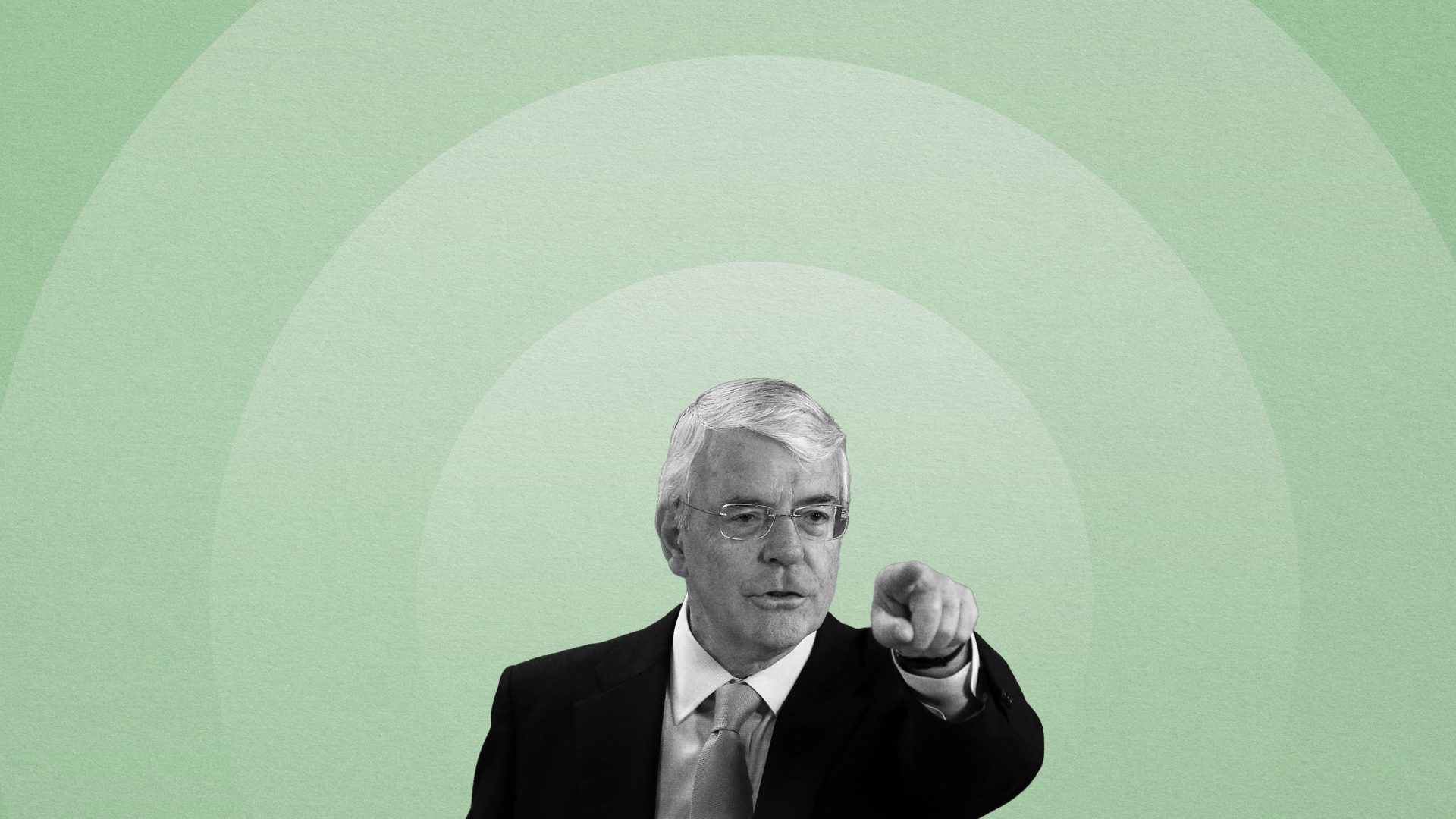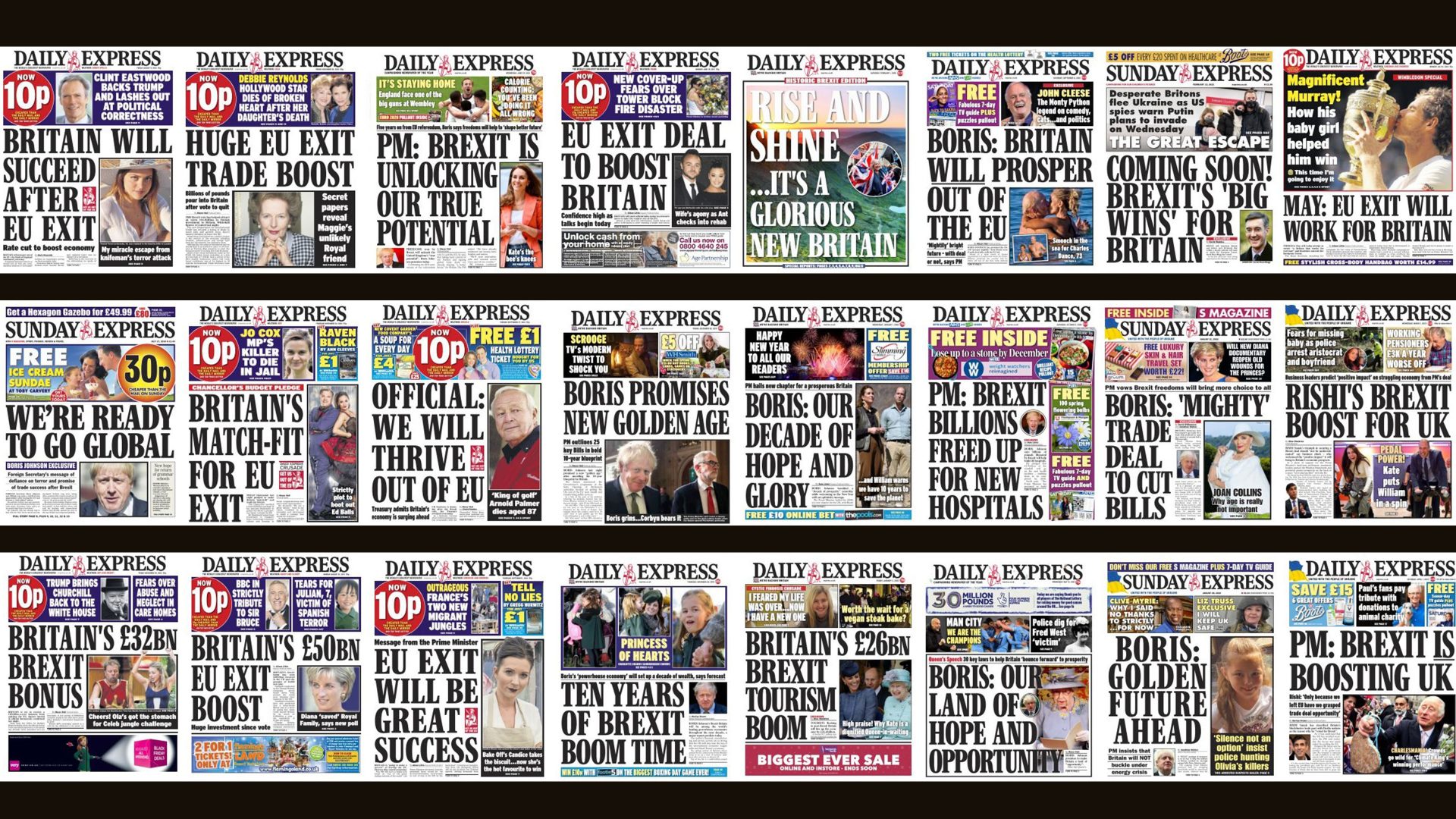In James Graham’s fantastic new play Dear England, which has just opened at the National Theatre, Gareth Southgate (Joseph Fiennes) agrees to manage the national team on condition that he is able to pose “uncomfortable questions about almost everything”. Which is the basis of all that follows.
Southgate took over in September 2016, three months after the Brexit referendum. So Graham’s drama about the renewal of England as a force on the pitch is also a drama about the broader story of the UK’s exit from the European Union and its consequences.
Theresa May, Liz Truss and Boris Johnson all make cameos. More seriously, when Southgate lays an England flag on the ground and asks the team what it means to them, Raheem Sterling reminds the other players how easily a symbol of healthy patriotism can be misused as an emblem of xenophobia and racism: “That’s all there. All in the mix”. Yes, it most certainly is: how are those “small boats”, prime minister?
Seven years on, Southgate is still at the helm and steering his team through qualifying for Euro 2024 in Germany. Meanwhile, on a parallel track, the full, ghastly impact of Brexit becomes clearer by the day.
How the hell did it happen? The question still scratches at the conscience. It was, in the end, an elite project rebranded as a great day for the popular will: it was a stupid idea, devised by clever people.
Michael Gove, Penny Mordaunt, Daniel Hannan, Dominic Cummings, Douglas Carswell, Johnson himself… all intellectually capable people, who nonetheless embraced, campaigned for and wrote into law a disastrous future for the nation.
Why? Vanity, a lust for power, and the narcotic of contrarianism played their respective parts. But it is still extraordinary to me that a group of talented individuals chose to conspire in such a predictably terrible course of action; to pool their abilities so that the UK might cut itself off from the world’s largest single market, secede from one of its most significant supranational alliances, and systematically reduce this country’s clout on the global stage.
Not since Soviet communism lured many English upper-middle-class hearts and minds in the 1930s has such a delusion gripped a sizeable clique within the nation’s elite. And I should have seen it coming sooner than I did.
I have a clear memory of Tony Blair, back in 1995, at a Times editorial lunch, saying: “These Tory Eurosceptics… what they really want is to leave the EU altogether. You do know that, right?”
No, no, I replied: most of them just wanted to keep a check on Euro-federalism, reduce the bureaucratic power of Brussels, stay out of the single currency. And guess what? I was wrong, and Blair was right.
Only with the rise of Ukip under Nigel Farage – whose malevolent contribution was to switch from abstract constitutional argument to low-punching cultural polemic about immigration – did it become fully apparent how potent the toxin was becoming.

In the wake of the financial crash of 2008-09, there was an appetite for anti-elitist populism; and the new digital technology was weaponising nativism and tribalism.
On June 23, 2016, David Cameron’s great gamble – a referendum to see off this challenge once and for all – went hideously wrong. Seven years later, the Conservatives are still in power; or in office, at least. Rishi Sunak is the fourth PM since Cameron left Downing Street. And the party he leads has ditched entirely the vision of the Notting Hill Tory modernisers who swept into power in 2010, in coalition with the Lib Dems.
For those of us who opposed Brexit vigorously it is no surprise that it has already proved to be a dreadful error. More striking is the readiness of some of its earliest champions to admit that the great project has not worked.
In May, Farage himself conceded on Newsnight that “Brexit has failed”. Naturally, he blamed this on “the Tories [who] have let us down very, very badly.” For the former Ukip leader, the fiasco is the consequence of betrayal, not the intrinsic idiocy of the original idea.
But a fiasco it most certainly is. In March, the Office for Budget Responsibility estimated that Brexit would slash 4% from the UK’s GDP (that’s £100bn less every year, or £40bn less for public services). According to the London School of Economics, Brexit added £210 to the average household grocery bill over the period 2020-21, an increase of 6%.
Trade openness fell by 8% between 2019 and 2021. As for red tape: the customs-export declarations that businesses must fill in when moving goods from the UK more than tripled after we left the single market and customs union. Business investment is now 31% below its pre-referendum trend. In May, the manufacturing sector contracted for a 10th consecutive month.
So Larry Summers, the former US treasury secretary, has all the data he needs to support his claim that Brexit was a “historic economic error”.
But, crushing as they are, the economic consequences of Brexit are only one aspect of the damage it has already caused. Where, for instance, is the super-charged “Global Britain”, free of the supposed shackles of EU membership, that we were promised? A sovereign nation free at last to flex its muscles on the global stage, liberated from the supposed aerodynamic drag of Brussels?
True, the UK has stepped up to the plate since Vladimir Putin’s invasion of Ukraine. But that is not a consequence of our exit from the EU. If anything, it encapsulates one of the tragedies of Brexit: that we have so recklessly forfeited our role as the gateway to Europe.
When Sunak signed the Windsor Framework in February and the European Commission president, Ursula von der Leyen, referred to him as “dear Rishi”, No 10 presented the moment as one of profound international consequence – rather than a tidying up of one of the many messes left by the original Brexit agreement.
For a clearer sense of the geopolitical price the UK has paid by leaving the EU, look at the way in which Sunak’s trip to Washington DC earlier this month was handled by the White House. Yes, there was plenty of pageantry. But the content of his discussion with Joe Biden was dismal. A global AI regulator based in London? Please. What the UK really needs is a muscular trade deal with the US, and that wasn’t even on the agenda.
When the only significant line-item to be cut in chancellor Sunak’s 2020 spending review was international development, and Johnson scorned overseas aid as a “giant cashpoint in the sky”, the rest of the world took note. The Brexiteers can bang on all they like about the exceptionalism of the UK. As a direct result of their actions, we are a smaller, less influential nation; easier to ignore in a world where interdependence, collaboration and alliance are increasingly important. To adapt Succession’s Logan Roy: Britain’s representatives are no longer seen as “serious people”.
Meanwhile, on the home front: the poisonous culture of resentment, post-truth and divisiveness that the Brexiteers turbo-charged in 2016 has not gone away. It has deepened and braided itself into public life. Brexit was not an event. It has proved to be a chronic condition, a malignancy that is still metastasising.
Witness, for a start, how routine it has become for senior Conservatives to blame not only the failure of Brexit but almost everything else on imagined conspiracies of “liberal elitists”, judges, Whitehall officials, the BBC, the “anti-growth coalition”.
Cummings, for one, has sculpted a career out of raging against the so-called “blob”. According to an email sent out in March in Suella Braverman’s name: “We tried to stop the small boat crossings without changing our laws. But an activist blob of left wing lawyers, civil servants and the Labour Party blocked us.” In April, Dominic Raab whistled the same tune, blaming his well-deserved fall on a group of “very activist civil servants”.
As for Johnson, he used one of his final Commons speeches as prime minister in July 2022 to claim that Sir Keir Starmer was plotting to take the UK back into the EU with the “deep state”. In his statement on June 9, when he resigned as MP for Uxbridge and South Ruislip, he alleged that the verdict of the Commons Privileges Committee that he had deliberately misled parliament over partygate was part of a “witch hunt” and a conspiracy “to take revenge for Brexit and ultimately to reverse the 2016 referendum result”.
Shrill betrayal narratives are the refuge of the political scoundrel, but they are also profoundly dangerous. The antisemitic Dolchstoßlegende (“stab-in-the back legend”) was essential to the growth of virulent nationalism in 1930s Germany. We are not yet in those dark waters. But the sharpened political instinct to detect treachery and conspiracy everywhere should be a matter of serious concern.
Its corollary has been the growing contempt of Tory politicians for our core institutions, for due process, for the law itself. Little more than a month after becoming PM in 2019, Johnson lied to the Queen about his request for the prorogation of parliament; claiming the proposed five-week suspension was essential to prepare the government’s legislative agenda, when its obvious purpose was to stop MPs seeking to delay Brexit. In September of that year, the Supreme Court ruled that his request had been unlawful.
Indeed, has any modern government been more scornful of the rule of law? The breaches of lockdown rules at the Downing Street parties were the behaviour of an oligarchy that does not believe itself to be subject to the tedious constraints of the law. Just as Johnson’s ministers said they were ready to breach international law to fix the Northern Ireland Protocol, so the revellers in No 10 knocked back the booze even as hundreds of thousands of Britons were prevented by Covid regulations from comforting their loved ones on their deathbeds. Noisily democratic in its origins, Brexit culture has proved profoundly hierarchical in practice: some Brexiteers are more equal than others.
And it is not just Johnson. Look at how shamelessly the PM is seeking to withhold evidence from the Covid inquiry. Observe, too, his readiness to oxygenate the culture wars and tribalist politics of identity that first surged during the referendum campaign.
Who would have thought that Sunak would have focused so zealously on the despicable (and futile) “small boats” strategy”? That he would have restored to the office of home secretary Suella Braverman, who said in October that she “would love to have a front page of the Telegraph with a plane taking off to Rwanda [carrying refugees]. That’s my dream, it’s my obsession”?
Braverman’s demagogic strategy is a direct descendant of Farage’s notorious “Breaking Point” referendum campaign poster. Her Illegal Migration bill has been denounced by the Archbishop of Canterbury; the United Nations Refugee Agency; and by the former prime minister, Theresa May. Yet such criticism merely emboldens her to press ahead.
That’s Brexit for you. It has encouraged ministers, when they encounter opposition of any sort, to believe that they are speaking for “the people” against its enemies: the oldest delusion of the autocrat.
And it has driven them firmly to the ideological right: in a speech in April, Robert Jenrick, minister of state for immigration, declared that “excessive, uncontrolled migration threatens to cannibalise the compassion of the British public” and that “those crossing [the Channel] tend to have completely different lifestyles… undermining the cultural cohesiveness”. Fifty-five years after Enoch Powell was sacked from Edward Heath’s shadow cabinet for declaring that racial tension would lead to a river “foaming with much blood”, his brand of rhetoric is now thriving in the Conservative mainstream.
In May, Braverman, Jenrick’s boss, was the star speaker at the National Conservative conference in London. In effect the launch of a UK chapter of the MAGA movement, this was hosted by the Israeli-American scholar, Yoram Hazony, who is also chair of the National Conservatism organisation. Among young Tories, his 2018 book, The Virtue of Nationalism, is perhaps the most influential text of the moment. For perspective: in 2005, the equivalent among followers of David Cameron was probably Jeffrey Sachs’s The End of Poverty.
Those hopeful that a Labour election victory will force the re-emergence of the One Nation tradition within the Conservative Party are in for a shock. That version of Toryism simply no longer exists: its ranks were purged by Johnson in 2019; its morale destroyed by Brexit.
So what are we left with? The true Brexit dividend has been a series of lessons. The UK’s exit from the EU was absolutely the wrong answer to a good question. Vote Leave’s key slogan – “Take Back Control” – spoke to the electorate’s sense that they were being short-changed, neglected, denied basic opportunities and services.
Cummings is absolutely right that the famous pledge on the side of a bus – promising an extra £350m for the NHS – was essential to his campaign’s victory. It was a lie, of course (“you have already won a major prize!”). But it resonated, deeply so.
Time and again, one is struck by the brutal irony of Brexit: that it raised expectations of dramatic improvements in the public sphere, but has, in practice, debased public life and diminished the commitment of the governing class to practical change. As the US commentator George F Will teaches us, statecraft is soulcraft; and the British soul has taken a beating in the Brexit years.
It is no coincidence that so many errors of policy were made during the pandemic or that our public services are on their knees. The politics of government are more performative than they have ever been, less mature, less substantial.
Does this mean, in the words of Private Frazer from Dad’s Army, that “we’re all doomed”? By no means. The polls show that almost two-thirds of Britons believe Brexit is a failure and – perhaps more importantly – that a similar proportion are open to another vote on the UK’s relationship with the EU.
Needless to say, I want us to resume membership as soon as possible. And, as cautious as Starmer remains on the question of Brexit, I think that a change of government would be a solvent in Westminster and Whitehall of many of the hardened orthodoxies of recent years. Most are vacuous slogans rather than meaningful governing principles. They can be swept away by fresh, focused thinking.
Yet this much I am sure about: the campaign to rejoin, when it begins in earnest, must not, cannot be a relitigation of 2016. It has to be fire-proof against the inevitable charge of “Remoaner” restorationism.
The new movement must be rigorously forward-facing; not a reproach to those who voted Leave seven years ago, but a path to a better future. A campaign that scolds voters will always fail.
Indeed, like Southgate with his flag, we must ask first what kind of country we want to be when we apply once more for EU membership. “This is a story,” he tells his players. “And you are the storytellers.”
What will our story be? What kind of Britain would we present to the 27 member states for consideration? First, the new government will have to work day and night to restore the public trust that Johnson so heedlessly trashed: which means granting new powers to the independent adviser on ministers’ interests, notably the right to initiate his or her own inquiries; the long-delayed overhaul of the second chamber and honours system; and much stricter rules on MPs’ second jobs and political lobbying.
There must be new deals on the climate emergency; on the regulation of digital technology; on the indefensible inequalities that are the downside of globalisation; on the supply of affordable property; on social care; on the taxation of wealth; and much else. Before we rejoin, all this work must be well under way.
In Dear England, Southgate’s psychological guru, Pippa Grange (Gina McKee), tells him that, to win, it is first necessary to learn how to lose. Well, the experience of Brexit has been a grim object lesson in precisely that: what loss feels like, on a global scale.
As the Conservative era draws to an agonising close, the country is crying out for the possibility of change. But none of this will happen by itself; there is no such thing as historic inevitability or a benevolent pendulum swinging in the direction of justice.
Which means there is no room at all for complacency. So wake up, get busy: it’s later than you think. Seven years of this nonsense is more than enough. It’s time to win again.




